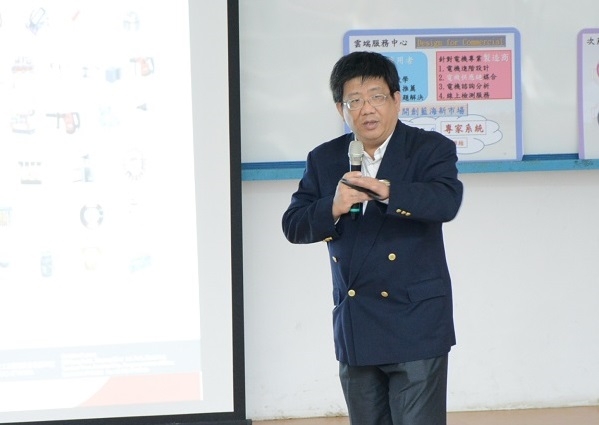Commencement of the Asia Silicon Valley IoT – Ta Ya Group to take part in smart manufacturing and smart business

2017/03/09
The Asia Silicon Valley Development Plan encourages relevant businesses in the IoT sector to partner up independently and foray into the global market. For the first phase of the plan, a total of 21 businesses across seven sectors were chosen. Among these businesses, AMIT system service (a spinoff venture of Ta Ya Group) will be collaborating with Taiwan Electrical and Electronic Manufacturers’ Association in the creation of a professional industrial park titled “Motor Island – Silicon Valley” under the theme of smart manufacturing. On the 8th, the AMIT system service held the “Motor-Silicon Valley – Solenoid System Seminar” at Ping-Wen Hall of NCU, drawing the participation of close to 100 representatives from related businesses.
Ta Ya and four other members of Taiwan Electrical and Electronic Manufacturers’ Association (TEEMA) jointly founded AMIT system service in December 2016 in the hopes of elevating Taiwan’s electrical and electronic industry to a new height through optimized practices, knowledge and services for motor designs. The idea of “Motor Island – Silicon Valley” was conceived to integrate the dozen of manufacturers in Taoyuan and construct a complete motor manufacturing ecology in Taiwan by offering one-stop services covering design, raw material supply, production, manufacturing, assembly, works-in-progress, finished products, verification and distribution, ultimately creating a common brand name of “Taiwan Motors-Silicon Valley”.
The contents of the seminar were highly informative and have drawn close to 100 related businesses in participation, many of them having come from central and southern Taiwan to be part of the event. TEEMA Director Yeh Yuan-Sen gave his address on “The next big trend in next-gen collaborative commerce innovation” using the establishment of AMIT system service as an example. At the same time, Taoyuan City Government also sent a representative to present on the latest progress of the “Asia Silicon Valley Development Plan”.
Hung Chi-Fung, an engineer from Ta Ya Magnet Wire Business Group, gave a presentation titled “Technical applications for improved motor performance with Ta Ya’s new materials”. In light of harsh operating environments involving exposure to high frequency and high temperatures, Ta Ya has developed a series of products such as surge resistant magnet wire, magnet conducting enameled wire, thermal conducting enameled wire, PIW with thermal resistance up to 240℃, LDW and so forth. In addition, the company also offers CCAW (for cost and weight-reduction) and FIW with zero-defect that delivers superior performance to the company’s TILW.

AMIT system service President Wu Chien-Yu followed up with his report on “A new collaborative innovation platform for electromagnetic power systems” and presented the company’s intention to create a collaborative design platform for electrical and electronic products with services from its Cloud Service Center, Sub-system Design Center, Inspection and Verification Center and Production Technology Center. The AMIT system service CDO Yeh Chi-Chun and design consultant Nian Yi-Yao illustrated how FEM-based Top-Down design approach can be applied in the fields of electromagnetic systems using solenoid valve and DC brushless motor as examples. Through computer assistance and machine learning, product designers in the future will be required to focus more on the inspiration of true creativities.
In addition, the organizer also invited representative from Daqing Energy-Saving Technology Co, Ltd. to make a presentation on “From smart motors to innovative applications in agriculture and fishing industries” to expand participants’ focus to other areas beyond industrial products and household appliances. Superrite Electronics Co., Ltd. covered “Developmental deployment and application technologies for magnetic materials” in detail while Taiwan Auto-Design Corporation showcased its ANSYS software to illustrate the innovations in collaborative design technologies made possible with a Cyber-Physical System (CPS).
The Asia Silicon Valley Plan was one of the reforms that President Tsai Ying-Wen proposed during her election campaign. It is a major industrial project on a national scale centered in Taoyuan with two fundamental tenets: “Addressing domestic demands” and “Venturing into the international market”. The former will involve the integration of technologies, funding and talents from silicon valley in Taiwan to create a world-class supply chain with high capacity for innovation while the latter will involve the construction of “Asia Innovative R&D Talent Exchange Center” in the vicinity of Taoyuan International Airport to become the hub of innovative exchange in Asia-Pacific. The Asia Silicon Valley Development Plan is expected to generate more than NT$ 1 trillion in GDP for Taiwan.
 In addition to the domain of smart manufacturing, iStaging (a spinoff investment by Taya Venture Capital, responsible for the sector of smart commerce) also briefed the participants on “Issues and experiences in domestic startup development”.

